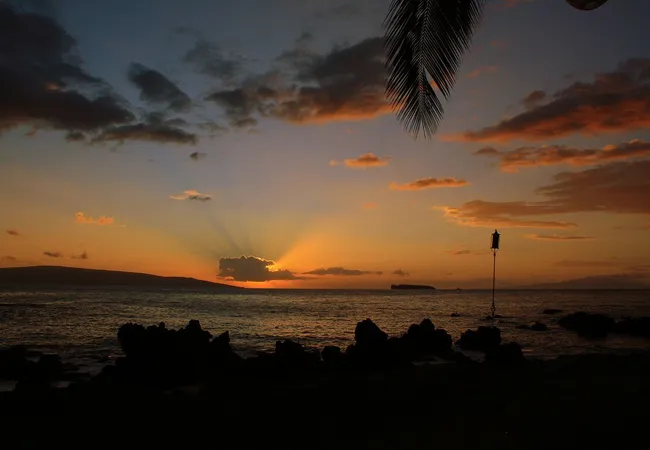
10 Ways To Be An Eco-Friendly Visitor in Maui

With fresh breezes blowing through your hair, the sun kissing your shoulders, and the ocean lapping at your toes, you are loving every moment and so happy to be a carefree visitor in Maui, Hawaii on vacation!
But while having the time of your life, it’s easy to forget that simple actions can have a big impact on our environment.
By making responsible choices, you can help save paradise from the perils of pollution, and many more environmental impacts that could degrade the natural beauty and wildlife of Maui.
Here are 10 ways to be an eco-conscious visitor in Maui.
 Chuttersnap / Unsplash
Chuttersnap / Unsplash
1. Rental Cars
Greenhouse gas emissions can really take their toll on the environment. Be a responsible visitor in Maui.
Minimize your carbon footprint by renting a car that has great gas mileage. Choose a hybrid, electric, or green model car.
Bio-Beetle Eco Rental Cars offers cars that use biodiesel, 50 mpg gas hybrids, and cars that are fully electric.
Gas guzzlers will not only hurt your wallet but the amount of fuel they are burning and releasing into the atmosphere is quite detrimental.
Also be conscious about your itinerary throughout the day, because minimizing the amount that you drive around also helps decrease the amount of carbon expended. A great way to be a helpful visitor in Maui.
 Fairmont Kea Lani. Katie Haugland Bowen, CC BY 2.0, via Flickr
Fairmont Kea Lani. Katie Haugland Bowen, CC BY 2.0, via Flickr
2. Accommodations
If you’re looking for a resort experience that still takes the environment into consideration, look no further than the Fairmont Kea Lani.
They are part of the Green Partnership Program, “a comprehensive commitment to minimizing the hotels’ impact on the planet”.
This partnership takes into consideration the hotel’s waste management systems, recycling and composting procedures, energy efficiency, and local community outreach programs open to all locals and visitors in Maui.
Utilizing homes that already exist, you can find some serious jungle hut steals, farm-based yurts, and other eco-friendly options that minimize excessive utility usage, harness solar power, and even some that are completely off the grid.
Hana Ranch. @hanaranch via Instagram
3. Eating and Drinking visitors in Maui
Maui has a smorgasbord of culinary delicacies to indulge in, but did you know that what you eat and drink can impact the environment in a big way?
The distance that your food and drinks have to travel leaves a carbon footprint, and given that Maui is an island, a hefty portion of all the food and drink is imported.
Take a stand by eating at restaurants that source their ingredients locally, as there are a number of reputable island farms distributing produce and meat to local restaurants perfect for every visitor in Maui.
With a plethora of fresh-caught fish, Kula-grown veggies, and fresh fruit stands all over the island - it is actually quite easy to manage your carbon footprint and still eat delicious food that is both nourishing and sustainable.
Check out Hana Ranch, Lumeria, The Mill House, and Monkeypod Kitchen for locally sourced delicacies.
RELATED: 5 Must-Visit Historic Sites in Maui
 Meghan Rodgers via Unsplash
Meghan Rodgers via Unsplash
4. Plastic Usage
While the state of Hawaii has already banned the distribution of plastic bags, there are still incidents where plastic rears its ugly head.
From produce bags at the grocery store to plastic straws with your mai-tais, making informed and aware decisions regarding your plastic consumption can make a big impact to marine life.
Plastic bags that blow into the ocean resemble a sea turtle’s favorite snack of sea jellies, while plastic cutlery and straws can end up trapped in the nostrils or throats of other marine wildlife.
When a sea turtle eats a plastic bag, its stomach sends the signal that it is apparently full, however, this signal continues to be sent to the brain while the turtle is continuously not ingesting any nutritious green algae or seagrass.
In time, the turtle will become emaciated and starve to death. Use reusable bags to prevent situations like this from happening to other marine wildlife.
Metal or bamboo straws and cutlery, as well as reusable bags, are all great essentials to keep with you to help prevent adding marine debris and polluting the oceans with plastic.
 David Baker via Unsplash
David Baker via Unsplash
5. Sunscreen Usage
Protecting our skin from the intense Hawaiian sun can seem like a simple task, just go to the store and pick the bottle with the highest SPF, right?
Believe it or not, the type of sunscreen you choose to buy can greatly affect the coral reefs of Hawaii.
There are two types of sunscreen, chemical and physical. Chemical sunscreens rely on chemical reactions to block out the UV rays, while physical sunscreen uses active ingredients that physically block the UV rays.
Harmful ingredients in chemical sunscreens include oxybenzone, avobenzone, and octinoxate.
The chemical ingredients have shown degrading effects on coral such as DNA mutation, as well as inhibiting their resilience from the effects of coral bleaching.
Be wary of sunscreens that claim to be ‘reef safe’, as there is no overarching organization that credibly identifies ‘reef safe’ sunscreens.
Look for those active ingredients of titanium dioxide and zinc oxide, but even better, try and cover them up with sun shirts, sun hats, and sun pants to minimize the amount of sunscreen going into the water.
@surfrider via Instagram
6. Volunteering visitors in Maui
Maui has an endless range of exhilarating adventures to partake in, but when you find yourself looking for an activity that is both fun and purposeful, look for environmental volunteer opportunities.
You can volunteer with wildlife organizations that focus on:
- sea turtles
- monk seals
- humpback whales
- and even primates
Respectively, check out the Hawaii Wildlife Fund, Hawaiian Islands Humpback Whale National Marine Sanctuary, and the Pacific Primate Sanctuary.
For more environmental opportunities look to the Surfrider Foundation, which focuses on the protection and preservation of oceans, waves, and beaches through conservation, activism, research, and education as well as the Hawaii Nature Center.
RELATED: Best Farmers Markets in Maui
Malama Maui Nui beach cleanup. @malama_maui_nui via Instagram
7. Beach Clean-ups
Various organizations, ranging from environmental ones like Malama Maui Nui to clothing brands such as eco-conscious bikini company, Manakai, will host scheduled beach clean-ups every month.
Maui Ocean Center, the Aquarium of Hawaii, actually incorporates a dive segment in their efforts where they have divers combing the reef for fishing lines, old lead weight,s, and other debris that could entangle wildlife.
Whether you are able to fill a whole garbage bag, or you only pick up three pieces of trash, your efforts can save the life of a sea turtle or sea bird.
All while also contributing to the overall health of our oceans.
Aqua Adventure boat tours. Peyri Herrera CC BY-ND 2.0 via Flickr
8. Boat Tours
There is an endless selection of boats to choose from depending on the experience you are striving for.
However, there is not a wide selection that utilizes eco-friendly standards or practices ocean awareness.
Some boats can have hundreds of people aboard, generating huge mounds of trash.
Avoid using grills designed to dump waste straight into the ocean and protocols disrespecting the coral and wildlife of Hawaii.
Look for a ride on Aqua Adventure. It is a family-owned operation that maxes out at 40 passengers, unlike some boats that run with 125 people.
Their use of biodiesel cuts down on their greenhouse gas emissions. And compared to other boats that will grill food during their charter, Aqua Adventure serves sandwiches and potato macaroni salad.
They do this to avoid dumping charcoal, lighter fluid, and other grilling detriment into the ocean. Aqua Adventure also prefers a vendor located in the harbor.
This helps minimize the carbon footprint when it comes to the delivery of the food.
 Photo by Silas Tolles on Unsplash
Photo by Silas Tolles on Unsplash
9. Hiking visitors in Maui
Enjoy a beautiful trek along with the amazing rewards of vistas and waterfalls.
But never forget how much impact your presence can have on the environment when hiking.
Make sure to always pack out what you pack in. Littering is one of the greatest offenses you can commit against nature, and it’s an easy one to avoid.
You should also be sure to stay on the marked trails rather than attempting to bushwhack your way through.
There may be vital species that you are impacting with your steps.
You could be crushing young sprouts, disturbing soil or even introducing new species that could clash with preexisting plants.
Even breaking branches is destructive behavior that we can avoid by staying on the marked trails.
Something as simple as creating alternate routes causes major disruptions in the water dispersal throughout the area.
This can cause formerly safe trails to be washed out.
When enjoying the many hikes Maui has to offer, be sure to stay vigilant about where you walk. And, take only photos and leave only footprints.
RELATED: Best Places To Catch A Sunset in Maui
 Photo by Salomon Riedo on Unsplash
Photo by Salomon Riedo on Unsplash
10. Souvenirs
At the end of your trip, you may find yourself craving a souvenir of the amazing adventures that you’ve had in Maui.
But before you reach for a piece of coral or a gleaming seashell, please think again.
Taking shells from the beach may not seem like it would influence much.
But you could be taking away a hermit crab or even putting yourself in danger if you happen to pick up a cone snail.
Cone snails contain a venom so powerful that the sting can sometimes be fatal. It’s difficult to tell for certain when a critter is home or not.
So always best to leave the shells at the beach.
Why Souvenirs Matter
Coral sometimes has the ability to regenerate from mere fragments. The same fragments you may have deemed dead to the ocean and acceptable for you to bring home.
Think before you decide to take a piece of coral from the ocean. And please never touch living corals on the reef.
Touching them can kill them while also potentially putting yourself at risk to their sharp skeletons and stinging tentacles.
Perhaps head to a souvenir store where they have baskets upon baskets of different kinds of shells and corals to choose from.
But be warned, encouraging the sale of these goods hurts the ocean. This demonstrates to the vendor that there isa legitimate interest in this product.
By abstaining from purchasing coral and shells, you can influence the amount of these goods sourced from the ocean.
Are you ready to be a responsible visitor in Maui?
Now you’ve equipped yourself with eco-savvy know-how how prepare yourself to have a vacation that you can both enjoy and feel positively about.
When you're an eco-conscious visitor in Maui (or anywhere for that matter) know that you are contributing towards a greener and more sustainable existence on our planet.
While there are many tour guides, restaurants, and adventures to choose from in Maui, we only have one planet.
So it's up to us to help preserve and nurture the environment as best we can.
Pack up that mineral sunscreen, sign up for a beach clean-up, and reach for a reusable straw, your Maui vacation awaits!
Ready to take a tour? Check out Shaka Guide's Maui Tours!
We hope that we’ve given you all the information you need to make the most of your day. Your vacation is extremely important to us so if you have any questions feel free to reach out at aloha@shakaguide.com.
MAUI TRAVEL GUIDES:
The Ultimate Maui Travel Guide
Which Maui Tour is Right For You?
Maui vs Oahu: Which Is Right for You?
MAUI ACTIVITIES:
15 Family-Friendly Activities in Maui
10 Must-Visit Historic Sites in Maui
Best Places To Catch A Sunset in Maui
Four Zipline Adventures in Maui
Like this article? Share it on Pinterest!




























 to fuel your ride
to fuel your ride 
